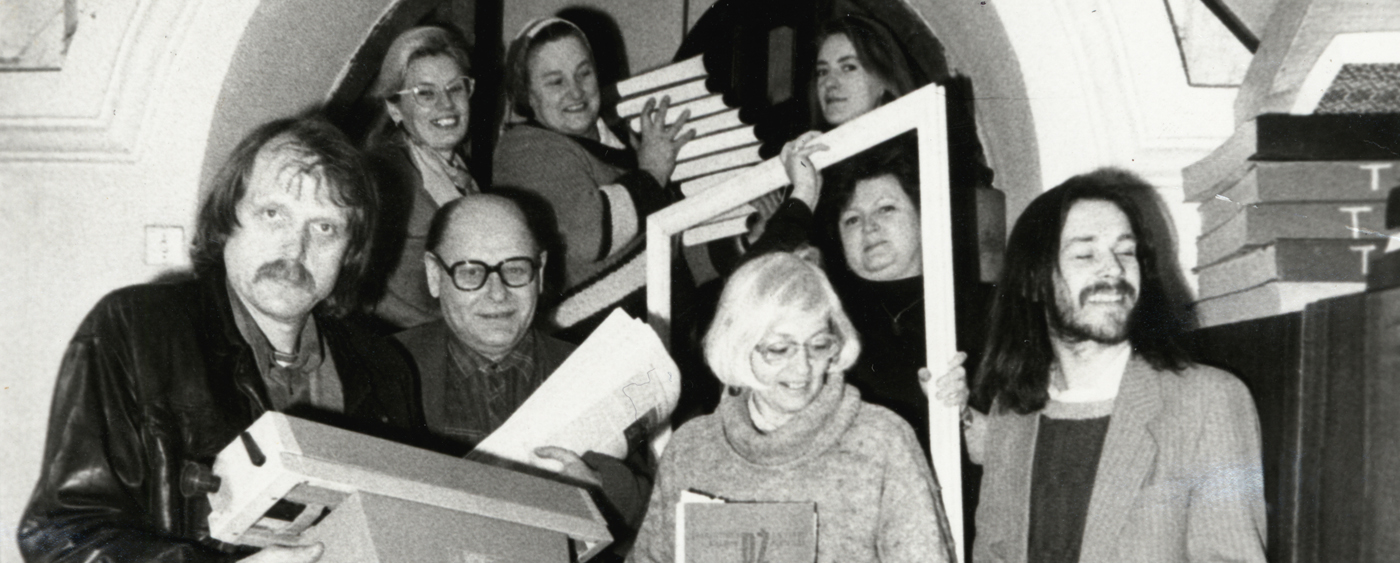Following the euphoria of the Sąjūdis national reform movement and the great hopes and dreams it inspired, the literary world, like the cultural community overall, gradually began to acclimate itself to more prosaic conditions of life (and survival). Literature seemed to find itself thrust into the center of a market place bustling in the trade of used Western cars, counterfeit designer clothing, and pirated audiocassettes. One literary critic and lecturer had this to say to his graduating class in 1993:
I would use the following metaphor to describe the situation facing today’s student of the arts: a violin player in a tailcoat playing Vivaldi’s sonatas at the Gariūnai Market. He appears strange and alien. Strange, because he looks different than the majority, and alien, because he doesn’t conform to that majority. Albertas Zalatorius, Literatūra ir laisvė, Vilnius: Baltos lankos, 1998, p. 81.
Many cultural figures were in a state of shock after finding that economic censorship was no less fierce than its ideological cousin. A growing crisis in literature was one of the most important issues being discussed in society in the early 1990s. Professor Viktorija Daujotytė had the following response to a question posed in 1997 by Benediktas Januševičius about the literary crisis:
I believe there were signs of a crisis in our literature and in our culture. Precisely during that critical period. When the stability of our artificially crafted world collapsed, the material foundation, that most important element, also collapsed. Publishing became more difficult as a result. The number of people employed in literature, especially in literary criticism, dropped quite suddenly. To be sure, the number of books also decreased. I believe we’ve reached a turning point now, however, and we no longer have what could be called a crisis situation. „Krizė, ištikusi literatūros krizę“. Su Vilniaus universiteto profesore Viktorija Daujotyte-Pakeriene kalbasi Benediktas Januševičius, Literatūra ir menas, 1997 01 18, p. 3.
For many writers, the loss of stature in society was a painful experience, while others sought out new solutions, getting used to genres of popular literature, and attempting to learn and grow accustomed to life as a professional writer—an occupation no different than any other.
|
Read more: Diverse Popular Literature.
|
Literary critic Jūratė Sprindytė wrote at the time that "the image of a new type of professional—the writer—is emerging. Before, a professional writer was someone supported by the state, and a member of prestigious commissions, presidiums and editorial boards. Now, it means a prolifically writing person with a diversity of life’s experiences: as a translator, critic, humorist, or journalist, writing prose, poetry, or essays for adults as well as adolescents." Jūratė Sprindytė, „Tarp amžinybės ir tuštybės“, Literatūra ir menas, 1997 01 04 Poet Vladas Šimkus added that a writer’s versatility does not emerge from a life of ease. Vladas Šimkus, „Literatūros pokyčių laikai“, Metai, 1997, Nr. 2, p. 152.
New publishing houses appeared ("Alma littera" and the Lithuanian Writers’ Union publishing house in 1990, "Baltos lankos" in 1992, and "Tyto alba" in 1993), while an increasing number of periodical publications offered new opportunities for professional writers making a living from their craft. Such writers, loyal to one publishing house and attempting to survive from their writing, included Ričardas Gavelis, Jurga Ivanauskaitė, and Juozas Erlickas—all collaborators with "Tyto alba", and Sigitas Parulskis, who began his career as an in-house writer for "Baltos lankos" who later moved to "Alma littera".
Nevertheless, the number of writers living solely from earnings received from works of fiction could still easily be counted on one hand. According to a sociological survey conducted in 2000, "72 percent of writers indicated that income from creative pursuits did not exceed 25%, and they were the only category of Lithuanian artists in which not even a single percent [of respondents] said they could survive solely from their literary work. Only 8 percent said that they could make a living from their creative work by “supplementing” it with some other activity, while the remainder claimed that creative work was only a supplement to their main source of income received from other work." Loreta Jakonytė, Rašytojo socialumas: lietuvių rašytojų savivoka XX amžiaus 10-ajame dešimtmetyje, Vilnius: Lietuvių literatūros ir tautosakos institutas, 2005, p. 92.
The circulation of cultural journals continued to shrink, as did their influence in public life. Contemplating literature became relevant for the cultural press alone, which meant that writers were discussing their craft within an almost completely closed circle. People began speaking of a developing syndrome of "writing into the void", with that void consisting of literary critics and a handful of members of the “literary class”. Mindaugas Kvietkauskas is convinced that “for a poet who is honest with himself (and not self-important), the feeling of a 'void' comes not from the absence of positive reviews or awards, but from a sense of loss of contact with one’s audience." Mindaugas Kvietkauskas, Elena Baliutytė [ir kt.], „1998-ųjų poezija: kokia ji buvo?: svarstymai“, Metai, 1999, Nr. 4, p. 77.
Heralds of the nation who roused the people to action during the Sąjūdis years had become ordinary citizens whose income often forced them to balance on the threshold of ruin. As if that weren’t enough, there were now plenty of declarative statements of disassociation from any (cultural) elite status—one of the most notable coming from writer Jurga Ivanauskaitė. „Esu žmogus – ir tiek“. Jurgos Ivanauskaitės ir Ritos Kubilienės pokalbis, Literatūra ir menas, 1993 07 17. For some, this was a cause for concern—for others, it brought joy and relief expressed with self-consoling overtones:
Until very recently, becoming a writer in Lithuania meant about the same thing as becoming a priest did at the start of this century. […] Books that once were a sign of middle-class taste are now equated to the price of sausage or cheese, and we’d much rather now line our shelves with videocassettes of action movies, pornos and other such lovely things. Literature has simply lost its earlier (unhealthy) level of universal significance—something that should be celebrated. The masses have finally thrown off the myth of The Writer, thereby automatically liberating the writer as well: he is now alone with himself, with his own conscience, desires and talent. „Esu žmogus – ir tiek“. Jurgos Ivanauskaitės ir Ritos Kubilienės pokalbis, Literatūra ir menas, 1993 07 17.
Literary critic Vytautas Kubilius summarized the first decade of Lithuania’s restored independence thus: "The sacred plateau upon which the poet once stood, holding the heavens aloft, is no more. Now, he speaks immersed in the dense stuff of the routine." Vytautas Kubilius, „Daiktavardėjanti poezija“, Metai, 2000, Nr. 3, p. 79–90.
Prakeiksmas (The Curse), a poem by Alvydas Šlepikas, might be a graphic description of the place of the poet and writer in society:
The Curse
(A monologue by the poet’s wife)
Take your damned lyricism, you ass
Take all your damned iambi and trochees
All your grammar
Your naked children go barefoot
Their eyes red and hungry
what did you get from poetry
but alcoholism and the clap?
Take your damned tears, you ass
and your entire fucking family
all your rondeaux
all your snack bars
and hamburgers, all your Literas
contorted and squinting you are
drunk and reeking
why stand there like Lenin
you self-gnawing worm?
Damn you to hell
did you at least
buy your son a bicycle
you scum?
(Waving him off and turning away.)
Murder would be too good for you.
The first decade of independence was marked by a cultural depression—by signs of self-contempt and dissatisfaction over an imminent cultural apocalypse, or, in the best case, with attempts to console one another that everything was as it was meant to be.
Circulation is as high as it needs to be; the size of audiences at literature readings is exactly as big as it needs to be; there is no—and never was any—public discourse with literature, nor is one necessary. Society is not a collective farm, and writers are not collective farm chairmen. It’s enough to listen to the lines of verse that ‘society’ dedicates to its loved ones at [televised] dedication concerts to understand that one illiterate scribbler would be enough to fulfill society’s wildest desires. Sigitas Parulskis, Atsakymai į anketą „Literatūra ir visuomenė“, Metai, 1995, Nr. 4.
Mindaugas Kvietkauskas responded to the situation with his text Nenoriu neobaroko (I Don’t Want the Neo-Baroque): "I keep looking within our literature and press for a brave and renaissance perspective, one that is finally confident in itself. I don’t want the Neo-Baroque." Mindaugas Kvietkauskas, „Nenoriu neobaroko“, Metai, 2001, Nr. 2, p. 114.
Translated foreign literature was a positive counterweight to the decline in the numbers of books and professionals working in the creative field. Atviros Lietuvos Fondas (Open Society Fund Lithuania), financed by American philanthropist George Soros, began to support the comprehensive publication of books on cultural history, contemporary philosophy, as well as works by select Lithuanian authors. The Fund established a foundation for the intellectual renewal of Lithuanian culture. Over a fairly short period, classical works from various eras and movements on philosophy, anthropology, political science and history became a critical part of university education programs. These included, among others, works by Heraclitus, Plato and Aristotle, Mircea Eliade, Johan Huizinga, Simone de Beauvoir and José Ortega y Gasset, Leszek Kołakowski, Hans-Georg Gadamer, Jean-François Lyotard and Michel Foucault.




Comments
Write a comment